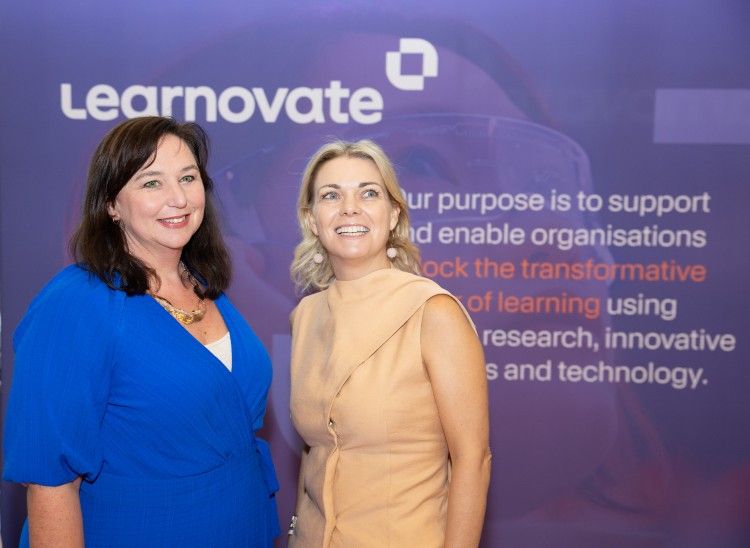Irish schools face a ‘homework apocalypse’ because of unregulated AI
Posted on: 14 October 2025
AI and learning expert Rita Bateson called for schools to implement AI policies before it overwhelms them, at this year’s Learnovation Summit.

Schools are experiencing a ‘homework apocalypse’ because of the way Artificial Intelligence is being used by students, parents and teachers. This is according to a leading AI and learning expert who is urging schools to learn to embed AI into the classroom before the speed and scale of it overwhelms them.
Rita Bateson, co-founder and Director of Education at Eblana Learning (pictured above on left), which provides AI guidance for international schools and teachers, made the call during Learnovation 2025, the annual global learning summit, which took place on 9 October. ’Reskill, Rethink, Reinvent’ was the theme of this year’s Learnovation Summit, which is organised by Learnovate, a research centre exploring the future of work and learning based at Trinity College Dublin.
Rita said that the ‘homework apocalypse’ has been created due to inconsistent AI policies, cognitive offloading by students and the untrustworthiness of AI-generated information. To stem the tide, she said, there was a need for collective responsibility, critical thinking and ethical AI adoption.
“We are in a homework apocalypse. While AI has many benefits, especially for students with special education needs, it has also created a situation where some teachers are turning away from homework entirely. It’s now so difficult to detect AI work. You might sense it but if you're going to accuse a child of using AI, especially in a high-stakes assessment, you need to be completely sure."
“AI is effectively impacting every single part of teaching and learning; teachers and schools, who are already incredibly busy, cannot keep up with the speed, scale and risks involved. Teachers are being inundated by sales pitches for AI platforms and torn between parents who are either wildly for or wildly against AI. One teacher is using AI to develop teaching resources while the next is scaring children about the evils of AI. There’s no consistency.
“It’s about figuring out how do we get downstream of that? How do we have a culture of trust and figure out what sustainable and ethical AI looks like in a school context? How can we protect what is worth protecting and innovate where we can? Conversations need to be held with the whole school community to agree how AI is being used by the school body as a whole. Schools are crying out for guidance.”
Rita also discussed cognitive offloading by students and the excessive and reckless adoption of AI in some cases.
“Many young people are now offloading a lot of their thinking and their research – and therefore a lot of their skill development – onto AI. When we thought tech was taking all our skills, we felt we could fall back on our critical thinking and creative skills but now AI is taking those skills away from us,” she said.
She said young people don’t have a sensitivity to the algorithmic so are living in their own bubbles. And even those who are quite critically aware are struggling to see what’s real as they are assuming everything is ‘fake news’.
“So, AI is having a real impact on truth. We need to teach children to have the mental discipline to know when not to offload to AI and when not to trust AI. We don’t want to make the same mistakes we did with social media; being so slow to regulate. It feels like we are sleepwalking into mistakes we’ve made in the past. We need to be more considerate and judicious. This is the perfect moment to put guard rails on AI. We have a really unique chance to get it right this time.”
Learnovate Managing Director Nessa McEniff (pictured above on right) said:
“As Rita highlighted so powerfully today, schools are on the frontline of the AI revolution. The challenges she describes are real and urgent, but so too are the opportunities. At Learnovation, we create a space for educators, policymakers and industry to come together and explore how AI can be adopted responsibly. We need to protect what matters in education while also preparing our children for a new and different future of work and learning. If we get this right, Ireland has the chance to lead globally in showing how AI can be implemented thoughtfully and ethically in education.”
Media Contact:
Catherine O’Mahony | Media Relations | catherine.omahony@tcd.ie
